Fair Trade
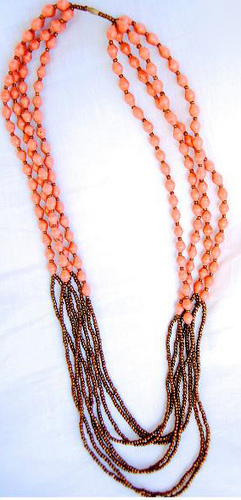
Through its Bead2Read program, ASSET also works with a network of talented women artisans from impoverished backgrounds who have low levels of educational attainment. ASSET provides training and professional development to advance their income-earning opportunities through the production of beautiful jewelry.This jewelry can be found in the Bead2Read Shop
These women artisans are extremely talented but often lack access to a market for their products and thus continue to earn a low income. ASSET provides a link to the U.S. market and any revenue generated from the jewelry provides a fair income for the artisans to support their families and educate their own children, while any additional revenue goes toward supporting higher education scholarships for young women. For these artisans, many of whom are the main income earners in their households, making this jewelry is their path out of poverty.
These are women who never had the opportunity to attend university; in fact, most have not completed secondary school, but they have hope that their own children will have greater opportunities and are excited that their work also supports a future generation of educated leaders.
Sipi Necklace – Light coral paper-beads are featured in this necklace, with cascades of accent glass bronze-colored beads. $31
Bead and Seed Necklace – Color-blocked emerald green and cream-colored paper beads meet locally-sourced dark brown seeds in this mid-length statement necklace. $34
Kara Necklace — Rich, earthy brown meets bright, grassy green in this mid-length four-strand paper-bead necklace. $31
Books
Fiction
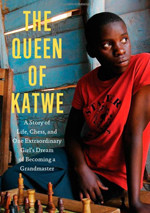
The Queen of Katwe: A Story of Life, Chess, and One Extraordinary Girlís Dream of Becoming a Grandmaster
By Tim Crothers
Scribner 2012
Phiona Metusi sleeps in a decrepit shack with her mother and three siblings and struggles to find a single meal each day. Phiona has been out of school most of her life because her mother cannot afford it, so she is only now learning to read and write. Phiona Mutesi is also one of the best chess players in the world.
One day in 2005, while searching for food, 9-year-old Phiona followed her brother to a dusty veranda where she met Robert Katende, who had also grown up in the Kampala slums. Katende, a war refugee turned missionary, had an improbable dream: to empower kids through chess—a game so foreign there is no word for it in their native language. Laying a chessboard in the dirt of the Katwe slum, Robert painstakingly taught the game each day.
When he left at night, slum kids played on with bottlecaps on scraps of cardboard. At first they came for a free bowl of porridge, but many grew to love chess, a game —thatlie their daily livesómeans persevering against great obstacles. Of these kids, one stood out as an immense talent: Phiona.
By the age of 11, Phiona was her country’s junior champion and at 15, the national champion. In September 2010, she traveled to Siberia, a rare journey out of Katwe, to compete in the Chess Olympiad, the worldís most prestigious team-chess event. Phiona’s dream is to one day become a Grandmaster, the most elite title in chess. But to reach that goal, she must grapple with everyday life in one of the worldís most unstable countries, a place where girls are taught to be mothers, not dreamers, and the threats of AIDS, kidnapping, and starvation loom over the people.
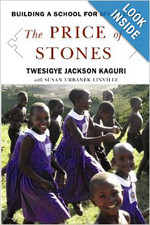
The Price of Stones: Building a School for My Village
By Twesigye Jackson Kaguri and Susan Urbanek Linville
Center Point 2010
Growing up in rural Uganda, Twesigye Jackson Kaguri overcame poverty to earn a degree from the national university and worked as a human rights advocate, eventually making his way to pursue studies at Columbia University. When he returned to his village in Uganda with his wife, they were overwhelmed by the plight of his village’s many AIDS orphans and vowed to open the first tuition-free school in the district for these children.
Faced with many daunting obstacles, including little money, skepticism among friends in both the U.S. and Uganda, corrupt school inspectors, and a lack of supplies, he doggedly built one classroom after another until they had an accredited primary school filled with students dreaming of becoming the future doctors, teachers, lawyers, engineers, and even presidents of Uganda.
The Price of Stonesis the stirring story behind the founding of the Nyaka AIDS Orphans School. Weaving together tales from his youth with the enormously inspiring account of the remarkable challenges and triumphs of the school, Kaguri shows how someone with a modest idea is capable of achieving monumental results.
Non-Fiction
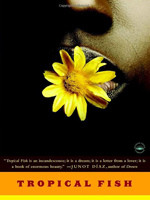
Tropical Fish: Tales from Entebbe
By Doreen Baingana
In her fiction debut, Doreen Baingana follows a Ugandan girl as she navigates the uncertain terrain of adolescence. Set mostly in pastoral Entebbe with stops in the cities Kampala and Los Angeles, Tropical Fish depicts the reality of life for Christine Mugisha and her family after Idi Amin’s dictatorship.
Three of the eight chapters are told from the point of view of Christineís two older sisters, Patti, a born-again Christian who finds herself starving at her boarding school, and Rosa, a free spirit who tries to “magically” seduce one of her teachers. But the star of Tropical Fish is Christine, whom we accompany from her first wobbly steps in high heels, to her encounters with the first-world conveniences and alienation of America, to her return home to Uganda.
As the Mugishas cope with Ugandaís collapsing infrastructure, they also contend with the universal themes of family cohesion, sex and relationships, disease, betrayal, and spirituality. Anyone dipping into Bainganaís incandescent, widely acclaimed novel will enjoy their immersion in the world of this talented newcomer.
Winner of the Commonwealth Writersí Prize for Best First Book in the Africa region
Winner of the Washington Writing Prize for Short Fiction
Finalist for the Caine Prize in African Writing

Waiting: A Novel of Ugandaís Hidden War
By Goretti Kyomuhendo
The Feminist Press at CUNY 2007
Set during the final year of Ugandan dictator Idi Aminís reign, this book illuminates the fear and courage of a small, close-knit community uncertain of what the edicts of a lunatic and his uncontrollable army will bring with each day. As Aminís war with Ugandan exiles and the Tanzanian army ends, one family learns what it takes to survive and eventually to plan for a new life. Author Goretti Kyomuhendo won the Uganda National Literary Award for Best Novel of the Year in 1999. She currently directs FEMRITE, a womenís publishing house in Uganda.
13-year-old Alinda’s first-person recollections of the dangerous last year of Idi Amin’s rule in Uganda. As the front of rebel-versus-Amin fighting approaches her village, Alinda’s mother is about to give birth. Rampaging soldiers reach the village and kill the midwife just as a son is born. Alinda must cut the cord. She must tend the baby, too, for as she obliquely imparts later, her mother dies.— Booklist
Films
Africa’s Daughters — 2008 — 25 minutes
Watch the documentary for free
In a country where a high school education is generally reserved for boys, Hoctavia is one of 31 children, most of whom dropped out of school. Ruth lives in a tiny apartment in one of Kampala’s poorest neighborhoods with her mother and three siblings. Graduating from high school is the only way they can lift themselves and their families out of poverty. Like millions of girls in Africa who will never move beyond primary school, their challenges are not unique. Their journey is.
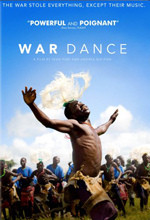
War Dance — 2008 — 107 minutes
The superb documentary War Dance reveals the redemptive power of music, even in the most horrific places. Focusing on three children in their early teens in war-torn Uganda—stoic Nancy, driven Dominic, and soft-spoken Rose— War Dance tracks the efforts of the school of a refugee camp called Patongo to compete in Uganda’s countrywide music competition. The contrasts are staggering; in interviews, the children describe their parents being killed by rebel soldiers, then footage of rehearsal shows them joyfully singing and dancing with their classmates. Some of the sequences are harrowing to watch, but without them we wouldn’t understand how hard-won are the feelings of pride and accomplishment as their school performs for the competition’s judges.
The heartbreaking circumstances and the emotional openness of the three teenagers makes War Dance even more compelling. In one particularly striking scene, Dominic talks to a captured rebel officer, hoping to learn if his brother is still alive. As they talk, the soldier – who’s around the age Dominic’s brother might be – tries to be helpful, and explains almost offhandedly why the brother is most likely dead. The casualness of this conversation, devoid of Hollywood histrionics, speaks volumes about how violence has infiltrated these people’s daily lives.- Bret Fetzer
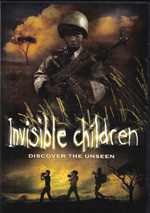
In the spring of 2003, three young filmmakers traveled to Africa in search of a story. What started out as a filmmaking adventure transformed into much more when these boys from Southern California discovered a tragedy that disgusted and inspired them, a tragedy where children are both the weapons and the victims. After returning to the States, they created this documentary — a film that exposes the tragic realities of northern Ugandaís night commuters and child soldiers.
Music

Samite is the stage name for African musician Samite Mulondo. Originally from Uganda, he now lives in Ithaca, NY. A multi-instrumentalist steeped in the traditional culture of his Ugandan upbringing, Samite was forced by a brutal war to flee his home as a young man. After years as a refugee in Kenya, he landed in the U.S. and began using his musical vision to give back to distraught people in African conflict zones.
Samite is also a co-founder of Musicians for World Harmony, a nonprofit organization that introduces music to African orphans.
Samite’s 9th CD is a collection of instrumentals that sprang from his deep knowledge of tradition. On this CD the producers explore the storytelling powers of many instruments and Africa’s melodic roots. (All proceeds go directly to Musicians for World Harmony.)
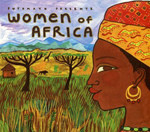
Putamayo presents Women of Africa
Women have always been at the center of sub-Saharan music, as they were the keepers of the hearth, intimately involved in the life-sustaining mysteries of agriculture, food preparation, birth, and death. However, Africa, like the rest the world, is in the throes of social change. Female roles are evolving and the artists heard here represent a confident, worldly sensibility. The roster encompasses Dorothy Masuka’s comfortable, gospel-flavored South African jazz, Maria de Barrios’ sensual Cape Verde an morna, and a liltingly tonal ballad from Paris-based Algerian refugee Souad Massi. But a major reason to purchase this album is the track by Khadja Nin of Burundi; her deep-toned, knowing, unpolished voice transforms a Stevie Wonder tune into an ecstatic anthem of empowerment. Each singer emerges as a force to be reckoned with as, one by one, their voices salute the earth and soar into the heavens. — Christina Roden
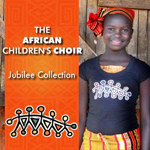
The African Children’s Choir is composed of children aged 7 to 10 years. Many have lost one or both parents through the devastation of war, famine and disease. They represent all the children of a continent and they demonstrate the potential of African children to become strong leaders for a better future in their land. In 1984, in the midst of Ugandaís bloody civil war, human rights activist Ray Barnett was called on to help the many thousands of orphaned and starving children, abandoned and helpless to feed and protect themselves. Ray and his team came up with a unique approach – ìnspired by the singing of one small boy, we formed the first African Children’s Choir to show the world that Africaís most vulnerable children have beauty, dignity and unlimited ability.
